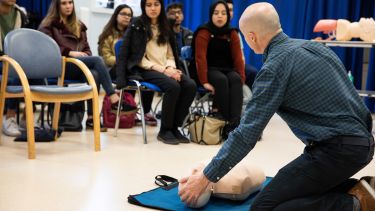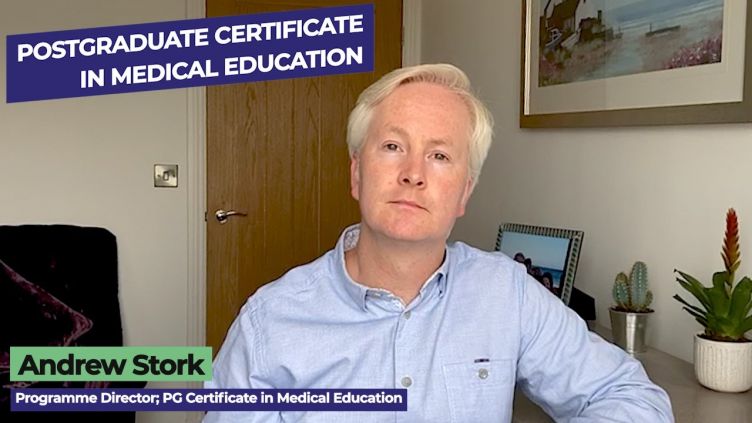Medical Education PG Certificate
School of Medicine and Population Health,
Faculty of Health
-
Start date
September 2026 -
Duration
1 year -
Attendance
Part-time
Explore this course:
Apply now for 2026 entry or join us on a discovery afternoon to see where a Sheffield masters could take you.

Course description
Lead academic
This course allows healthcare professionals to connect the theoretical principles of effective learning and teaching with their practice as educators. It is suitable for all health professions educators and is designed to enable you to fit your studies around your professional commitments. Students come from a wide range of disciplines, including doctors, dentists, nurses and physician associates.
The University of Sheffield is a leading centre for medical education: this course has been running for more than 20 years and you will be taught by a highly experienced, multi-disciplinary team.
Study key concepts in learning, teaching, assessment and curriculum – for example, how to design and facilitate effective learning – beginning with more managed settings such as lectures, seminars, skills-based sessions and one-to-one tutorials.
You will then learn how to develop safe, effective and sustainable learning in your workplace, focussing on helping your learners effectively integrate and participate in the clinical setting, become independent practitioners and develop their skills.
In the final part of the course, you will evaluate an area of a curriculum you are familiar with and propose ways to improve it. The learning focuses on what a curriculum is, frameworks for its design, how to evaluate it, the role of assessment and the influence of policy.
This course requires attendance at mandatory in-person study days. The relevant dates can be found in the Modules section of this page.
Applications
This course has limited capacity, and we review applications on a first-come, first-served basis. This means that we may have filled all our places before the advertised application deadline.
Accreditation
Accredited by the Academy of Medical Educators
Modules
This course requires attendance at mandatory in-person study days. The relevant dates can be found in the second tab in the box below.
The course consists of three 20-credit modules. Each module includes two study days. During the two study days, the core elements of the module will be explored, with examples from practice used to illustrate key components. Each participant will be expected to participate in approximately eight weeks of online activity.
Core modules:
- Effective Learning and Teaching
-
This module focuses on how to design and facilitate effective learning, particularly within more 'managed' settings, for example in lectures, seminars, skills-based sessions and one-to-one tutorials. Through two face-to-face study days and online learning, students are introduced to a range of practical and theoretical concepts. These concepts inform students, for example, on how to write effective learning outcomes, how to create teaching sessions which reflect particular types of learning, and how to choose appropriate learning, teaching and assessment activities. Students take part in tutor and student-led sessions, developing knowledge and skills which are transferable to their own practice and context.
20 credits - Work Based Learning
-
This module focuses on how to develop effective learning in workplace settings. Through two face-to-face study days and online learning, students are introduced to a range of practical and theoretical concepts. These concepts inform students, for example, on how to help their learners effectively integrate and participate in the workplace, assist learners to become progressively independent and support their skill development. Students will also consider how to ensure learning is safe, effective and sustainable. Students take part in tutor and student-led sessions, which involve developing a work-based learning and teaching plan for their specific workplace setting.
20 credits - Curriculum Design and Development
-
This module focuses on how to use curriculum design and development concepts to evaluate part of a curriculum. Through two face-to-face study days and online learning, students are introduced to a range of practical and theoretical concepts. These concepts inform students, for example, on what a curriculum is, widely used frameworks for the design and evaluation of medical curricula, and the role of assessment. Students will also consider how policy influences curriculum design and development. Students take part in tutor and student-led sessions, which involve evaluating areas of curriculum relevant to their practice and propose ways to improve them.
20 credits
Please note that attendance at these study days is mandatory for all students on the course.
Induction Day
Monday 14 September 2026, 1pm – 3pm (online via Blackboard)
Module 1
- Study day 1: Tuesday 22 September 2026, 9.30am – 4pm
- Study day 2: Tuesday 29 September 2026, 9.30am – 4pm
Module 2
- Study day 1: Tuesday 5 January 2027, 9.30am – 4pm
- Study day 2: Tuesday 12 January 2027, 9.30am – 4pm
Module 3
- Study day 1: Tuesday 20 April 2027, 9.30am – 4pm
- Study day 2: Tuesday 27 April 2027, 9.30am – 4pm
The content of our courses is reviewed annually to make sure it's up-to-date and relevant. Individual modules are occasionally updated or withdrawn. This is in response to discoveries through our world-leading research; funding changes; professional accreditation requirements; student or employer feedback; outcomes of reviews; and variations in staff or student numbers. In the event of any change we will inform students and take reasonable steps to minimise disruption.
Open days
Interested in postgraduate taught study? Join us on a discovery afternoon to see where a Sheffield masters could take you or register your interest in studying at Sheffield.
Duration
1 year part-time
Teaching
We'll confirm information about the course induction and study day dates soon. We'll update this page in due course.
You'll also be taught through practical activities, online discussions and independent study.
Assessment
Each module is assessed through written submissions.
Your career
Our graduates have gone on to a wide range of roles in medical and healthcare education, training and supervision. These include senior management roles such as NHS Training Director and Armed Forces Training Commander, as well as academic positions in higher education. They work in many healthcare settings including the NHS, private healthcare and universities around the world.
Student profiles

This course has helped me to improve my confidence and gave me an understanding of what can be done to improve the learning experience of my students
Dr Ahmed Shakir Mohammed
Consultant Paediatrician, Diana Princess of Wales Hospital,
PGCert Medical Education

This course has really helped me improve the way I teach by giving me the tools to better structure and plan my sessions.
Hannah Murphy
Practice Education Facilitator,
PG Cert Medical Education

This course helped me understand the complexities of medical education that we often take for granted
Claire Dewshi
Orthodontic Specialist Registrar, Queen Victoria Hospital,
PGCert Medical Education

The course has been invaluable in equipping me to become a more knowledgeable educator as well as increasing my awareness of the GP trainee curriculum
Ria Agarwal
Postgraduate student,
PGCert Medical Education
Entry requirements
You will need:
- a recognised degree in a healthcare profession and
- experience in teaching or supervising learning in a healthcare or related setting and
- access to learners in a healthcare or related setting.
English language requirements
IELTS 7.5 (with 7 in each component) or University equivalent.
As this course is taught part-time, it is not open to applicants who require a visa to study in the UK.
Other requirements
If you have any questions about entry requirements, please contact the school.
Fees and funding
Information for employers
NHS Trusts who want to find out more about how to access this course for their staff can contact the course director, Andrew Stork, by emailing a.stork@sheffield.ac.uk.
Apply
You can apply now using our Postgraduate Online Application Form. It's a quick and easy process.
Contact
Any supervisors and research areas listed are indicative and may change before the start of the course.
Recognition of professional qualifications: from 1 January 2021, in order to have any UK professional qualifications recognised for work in an EU country across a number of regulated and other professions you need to apply to the host country for recognition. Read information from the UK government and the EU Regulated Professions Database.




